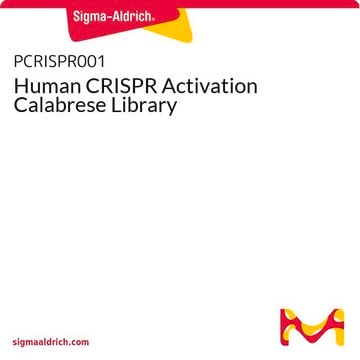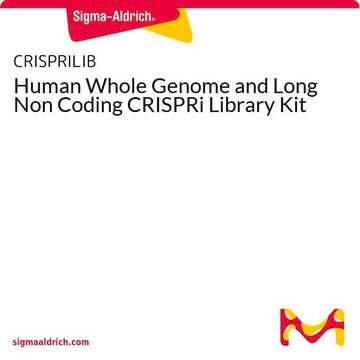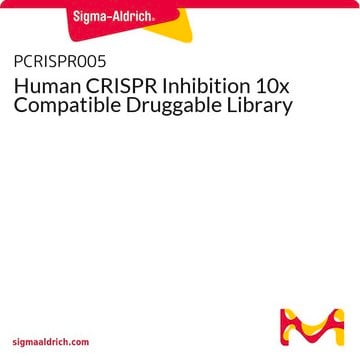Recommended Products
packaging
pkg of 10 vials (5x200µL aliquots of each component)
concentration
≥5x108 VP/ml (via p24 Assay)
application(s)
CRISPR
shipped in
dry ice
storage temp.
−70°C
General description
Custom pools for follow-up screening or 10x Genomics Compatible CRISPR pools are also available by contacting your local sales representative.
Application
- Functional Genomics/Target Validation
- Focused forward genetic activation screening
- Validated positive and negative controls
- Set up and optimization of screen assay
- Creation of cell lines stably expressing KRAB-dCas9
Features and Benefits
- Focus on your research, and we will generate your lentivirus screening library
- Compact and ready to use CRISPRi library ~6 sgRNAs
- Optimized (F+E) gRNA scaffold (pools are gRNA-only, KRAB-dCas9 sold separately)
- Can be paired with CRISPRICON to ease optimization using validated positive control targeting RAB1A and non-targeting control for assay setup
- UCOE KRAB-dCas9 for consistent effector expression across a wide variety of cell lines
- Ease of optimization: Utilizes BFP and Puromycin as selection markers under EF1alpha promoter.
Components
PCRISPR003A - Human CRISPR Inhibition Dolcetto Library Set A
PCRISPR003B - Human CRISPR Inhibition Dolcetto Library Set B
Principle
Storage Class Code
10 - Combustible liquids
WGK
WGK 1
Flash Point(F)
Not applicable
Flash Point(C)
Not applicable
Regulatory Listings
Regulatory Listings are mainly provided for chemical products. Only limited information can be provided here for non-chemical products. No entry means none of the components are listed. It is the user’s obligation to ensure the safe and legal use of the product.
Cartagena Act
Cartagena Act Listed
JAN Code
PCRISPR003-1KT:
Certificates of Analysis (COA)
Search for Certificates of Analysis (COA) by entering the products Lot/Batch Number. Lot and Batch Numbers can be found on a product’s label following the words ‘Lot’ or ‘Batch’.
Already Own This Product?
Find documentation for the products that you have recently purchased in the Document Library.
Our team of scientists has experience in all areas of research including Life Science, Material Science, Chemical Synthesis, Chromatography, Analytical and many others.
Contact Technical Service








